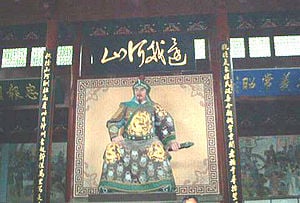Long a defender of the Southern Song Dynasty, the loyal — and frequently successful — General Yue Fei met an untimely end at the age of 39 when his government executed him for treason on January 27, 1142. Plotted against by members of the royal court campaigning behind his back for a surrender to the Jin Dynasty of the north, Yue has gone on to serve as an example of intense devotion for generations of Chinese. According to the most reliable sources, Yue’s life began in Anyang prefecture on a farm. Now the stuff of legend, he is reported to have cried so hard as an infant the Yellow River flooded. Working the fields with is father, he aspired to a career as a military officer. One account of his young life portrays Yue as an expert marksman with the bow and arrow from a young age — others go so far as to declare he was adept with both hands — but it seems certain he took a position in the army around the age of 19. While serving his country valiantly on the fields of northeastern China, he helped to secure Song lands against the advance of the Jurchen armies fighting from the Jin territories in Manchuria. Regarded by many as an astute tactician and learned soldier capable of discussing ancient Chinese military history with the highly-respected scholars of Song society. Committed to the preservation of Emperor Gaozong’s territories, Yue is said to have asked his mother to inscribe a simple message across his back: “serve the country with the utmost loyalty.” Advancing up the ladder from the humblest of backgrounds, it seems as though the mantra served him well. Doing his best to adhere to the Confucian ideal of moral development, community patriotism and saintly kindness, Yue earned the respect of those who served alongside him or followed his lead. Except, that is, for a group of Song nobles led by Chancellor Qin Hui hoping to force the emperor to surrender. Realizing Yue’s successes near Kaifeng might thwart any hope for a capitulation, Qin convinced Emperor Gaozong to bring the general back from the front. Upon his return, Yue was taken directly to prison. General Han Shizhong wondered aloud what his fellow officer did worthy of such a punishment. “Mo xu yu,” Qin replied — “something fairly likely.” With Yue having such a sterling reputation for service on behalf of the Song, Qin worked hard to create a series of accusations against the general in order that he might be executed. Once he and other advisers swung the emperor’s opinion toward a guilty verdict (and after several months of torturing his victim in an attempt to force a confession), Yue was killed on January 27, 1142. Just two decades later, with the extent of the treachery revealed to Emperor Xiaozong, Yue’s standing would be restored and monuments erected to his steadfast commitment in the face of false accusations. He remains an inspiration throughout China and Qin’s words — “Mo xu yu” — are used by natives to describe trumped-up charges of any kind to this day. Also On This Day: 1606 – Guy Fawkes is put on trial for the Gunpowder Plot 1888 – The National Geographic Society is founded in Washington, DC 1943 – The United States 7th Bomber Command launches the first American air raid against Germany 1945 – The Auschwitz-Birkenau concentration camp is liberated by the Red Army 2006 – Western Union discontinues its 155-year-old telegraph service You may also like : January 27 2006 – Western Union discontinues its 155-year-old telegraph service
January 27 1142 – Fabled General Yue Fei is Wrongfully Executed
Long a defender of the Southern Song Dynasty, the loyal — and frequently successful — General Yue Fei met an untimely end at the age of 39 when his government…
359
